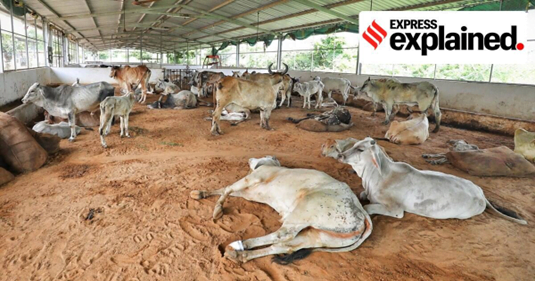Science and Technology
- Lumpy Skin Disease (LSD), a viral infection of cattle has been observed in several states of which Gujarat and Rajasthan are more affected states.
- In Rajasthan, around 27,000 cattle heads have reportedly succumbed to the virus. Since 2019, outbreaks of the disease have been reported in 20 states of India.

What is the LSD virus?
- LSD is caused by the lumpy skin disease virus (LSDV), which is a virus of the capripoxvirus genus in the poxviridae family.
- Sheeppox virus and goatpox virus are the other members of the genus capripoxvirus.
- The LSDV mainly affects cattle — cow and its progeny, and the Asian water buffaloes.
- However, the disease is not zoonotic, meaning it does not spread from animals to humans, and humans cannot get infected with it.
Areas of its prevalence: According to the FAO report, LSD was long restricted to sub-Saharan Africa. However, over the past decade, it spread to the Middle East and Turkey.
How it spreads?
- The LSDV spreads through blood-sucking vectors like ticks and mites like houseflies, mosquitoes, etc.
- It also spreads through contaminated water, fodder, and feed. Mosquito and housefly infestations which remain at their peak during the monsoon season.
Symptoms of LSD:
- Signs of infection include the appearance of circular, firm nodes on the animal’s hide or skin that look like lumps.
- Infected animals immediately start losing weight and may have fever and lesions in the mouth, along with a reduced milk yield.
- Other symptoms include excessive nasal and salivary secretion.
- Pregnant cows and buffaloes often suffer miscarriage and, in some cases, diseased animals can die due to it as well.
What is the Government response to check its spread:
- As LSD being a viral disease, there is no specific cure once an animal contracts the virus and therefore vaccination is the most effective tool.
- Animal husbandry department has been providing free treatment to infected cattle and has been appealing to dairy farmers and cattle-herders to contact it via its helpline number 1962.
- Setting up isolation centres for feral cattle in urban areas while prohibiting cattle fairs and exhibitions and transportation of cattle in the affected areas.
Source: Indian Express












